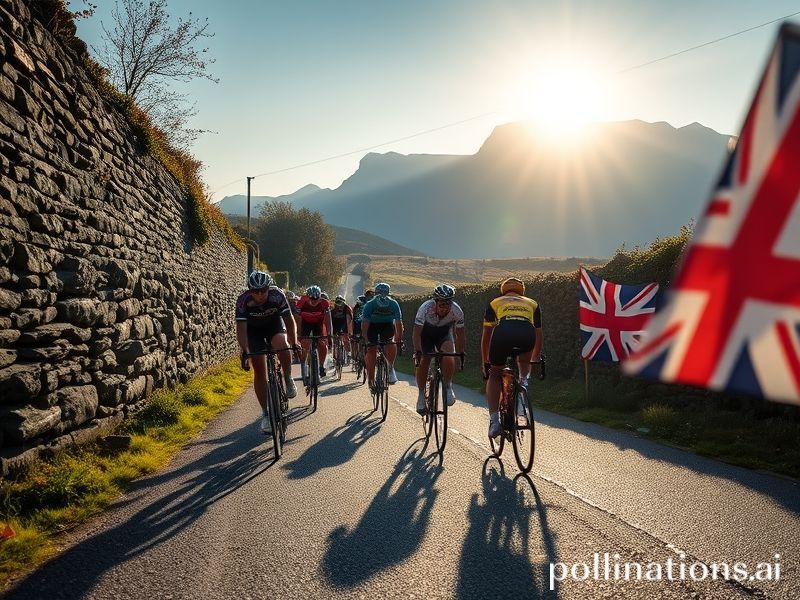Tour of Britain Live: How a Rain-Soaked Bike Race Became the World’s Most British Geopolitical Rorschach Test
LIVE FROM THE ISLE OF MILD PANIC – Tour of Britain Rolls Out Like a Brexit Negotiation: Slow, Rain-Soaked, and Nobody Quite Sure Where It Ends
*By Our Man in the Peloton, Who Has Survived Worse Traffic in Jakarta*
Every September, the Tour of Britain limps onto the world stage the way a soggy scone lands on a paper doily: proudly British, faintly underwhelming, yet somehow essential to the national myth. This year, as the live feed flickered across 150-odd countries, global viewers asked the same question: “Is that drizzle or just the collective tears of disappointed bookmakers?” From Lagos to Lima, the peloton—an international smorgasbord of Dutch thighs, Colombian lungs, and one brave Luxembourger who thought “UK weather” sounded quaint—pedaled past hedgerows, roundabouts, and the existential dread of post-industrial high streets.
To the uninitiated, it’s merely a mid-tier WorldTour race, ranking somewhere between “Strade Bianche” and “your cousin’s Zwift birthday ride.” But zoom out and the Tour of Britain is a geopolitical Rorschach test. The live helicopter shots glide over offshore wind farms—those sleek white monuments to post-Brexit energy insecurity—before cutting to crumbling council estates where the only green policy in evidence is moss. Each drone swoop is a gentle reminder that while Britain still stages charming pageants, it can’t quite stage central heating.
International sponsors understand the soft-power calculus. Ineos, a company that moved its headquarters to Switzerland for tax purposes, slaps its logo on British cycling like a duke sticking a flag in somebody else’s colony. UAE Team Emirates barrels through Devon lanes as if auditioning for a Bond villain’s countryside lair. Even the Chinese bike manufacturer providing neutral service cars gets a cameo, proving that when the world order wobbles, everybody wants a seat in the broom wagon.
The racing itself? A masterclass in controlled futility. Riders attack, get reeled in, attack again, like UN climate resolutions. The breakaway survives just long enough to trend on cycling Twitter—population: 47 journalists and an angry Slovenian—before the sprinters’ teams annihilate hope on the final drag into, say, Warrington. Global audiences marvel at the quaintness of finishing circuits that include speed bumps and a Greggs. Somewhere in Belgium, a teenager watches, mouth agape, wondering why the peloton isn’t being shelled by crosswinds off the North Sea. Answer: it is, but the British commentary team calls it “a light breeze.”
Viewing figures reveal the true international intrigue. In Colombia, they tune in praying Esteban Chaves can crack the top ten, thereby securing another year of national-hero status and discounted dental work back home. In Australia, the broadcast starts at 2 a.m.; bleary-eyed fans balance pavlovas on their knees, pretending the time gap to the leaders is merely a metaphor for distance from the motherland. Meanwhile in the United States, NBC buries the stream behind a paywall labeled “Cycling Plus,” a cruel joke since it’s mostly minus everything except advertisements for testosterone supplements.
The Tour’s broader significance crystallised on Stage 5, when the race skirted the Sellafield nuclear plant. For three surreal minutes, the world watched cyclists in neon Lycra outsprint a cloud that may or may not have been radioactive steam. Twitter exploded with memes comparing the peloton to diplomats fleeing a summit on non-proliferation treaties. Somewhere in Pyongyang, a bureaucrat took notes.
By the final circuits in Aberdeen, the peloton looked like a UN peacekeeping force—exhausted, underfunded, but still politely waving at roadside children. The eventual winner, a Belgian who pronounces “Edinburgh” like a sneeze, thanked his teammates, his nutritionist, and “the British fans for not stealing my bike.” It was the most sincere applause of the week.
And so the Tour of Britain fades to black until next September, leaving behind only empty gel packets and the lingering suspicion that the world’s tiniest violin is carved from Yorkshire teak. International observers switch to the Vuelta a España, where at least the sunburn feels authentic. But don’t be fooled: somewhere in a London pub, a civil servant is already drafting the post-race report, noting that soft power, like chamois cream, must be reapplied liberally and often—even if the shorts are already soaked.







